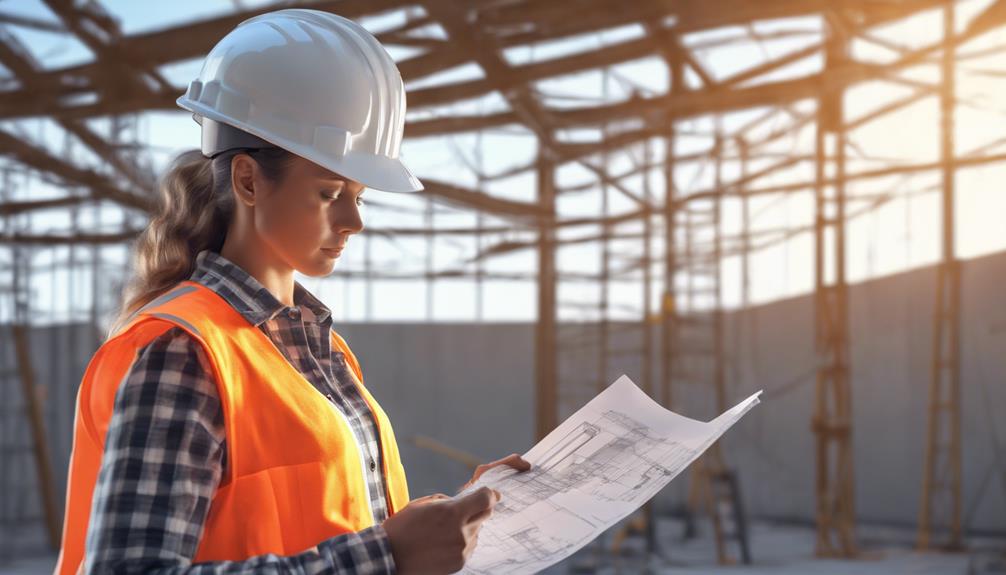Building Inspector Job Description
Building inspectors evaluate structures for code compliance, inspect safety measures, and assess construction materials. They identify hazards, scrutinize fire safety, and guarantee structural integrity. Essential skills include technical aptitude, communication, and problem-solving abilities. Knowledge of building codes is essential for maintaining safety and preventing legal implications. Report writing is meticulous and vital for clear communication. Building inspectors play a critical role in the industry's safety and enjoy a promising career outlook. Advancement opportunities include supervisory roles, specialization, and staying abreast of industry trends. Learn more about the detailed job responsibilities, qualifications, skills, and career growth in this field.
Key Takeaways
- Evaluate structures for compliance with building codes and regulations.
- Inspect safety protocols to ensure necessary standards are met.
- Assess construction materials for quality and suitability.
- Communicate findings clearly to clients, contractors, and stakeholders.
- Stay updated on technical knowledge for regulatory changes.
Job Responsibilities
In the role of a building inspector, one must meticulously evaluate structures for compliance with building codes and regulations. This involves inspecting safety protocols to make sure that buildings meet the necessary standards for occupancy and use. Building inspectors are responsible for assessing construction materials used in a project to verify their quality and suitability for the intended purpose. They must have a keen eye for detail to identify any potential hazards or violations that could jeopardize the safety of the structure or its occupants.
When evaluating safety protocols, building inspectors scrutinize various aspects of a building, such as fire safety measures, structural integrity, and adherence to zoning regulations. They also examine construction materials to confirm that they meet industry standards and are installed correctly according to the approved plans. By meticulously reviewing these elements, building inspectors play an important role in upholding the safety and integrity of buildings within their jurisdiction.
Qualifications and Education
Building inspectors must possess specific qualifications and education to effectively carry out their responsibilities in ensuring building code compliance and safety standards. Education requirements for building inspectors typically include a high school diploma or equivalent, along with specialized training in areas such as construction technology, engineering, or architecture. Some employers may prefer candidates with an associate or bachelor's degree in a related field.
Experience levels for building inspectors can vary depending on the employer and specific job requirements. Entry-level positions may only require completion of a formal training program, while senior or supervisory roles often necessitate several years of experience in the construction industry or as a building inspector. Hands-on experience in construction, building maintenance, or a related field is highly valuable for building inspectors to effectively assess structures for compliance with regulations. Additionally, obtaining certifications or licenses related to building inspection or construction can enhance a candidate's qualifications and credibility in the field.
Skills Required
Possessing a diverse set of technical and analytical skills is essential for building inspectors to effectively evaluate structures for compliance with building codes and safety standards. Communication skills are critical as building inspectors often interact with contractors, architects, and property owners to explain inspection results and address any issues that may arise. Problem-solving abilities are also indispensable to assess complex structural problems and propose solutions to guarantee buildings meet regulatory requirements.
Attention to detail is a key skill for building inspectors to identify code violations and safety hazards accurately. Additionally, technical knowledge plays a significant role in understanding construction principles, materials, and methods to assess the quality and safety of buildings. Building inspectors must continuously update their technical expertise to keep pace with advancements in the construction industry and regulatory changes, ensuring thorough and accurate inspections.
Building Codes Knowledge
Understanding building codes is essential for a building inspector as it guarantees code compliance, which is indispensable for the safety and integrity of structures.
Building inspectors must have a thorough grasp of regulations to accurately assess construction projects and identify any violations.
Additionally, strong documentation skills are crucial for recording inspection findings and communicating them effectively to stakeholders.
Code Compliance Importance
A strong understanding of building codes is vital for ensuring compliance with regulations and maintaining structural integrity in construction projects. Building inspectors play a pivotal role in upholding these standards to safeguard public safety and prevent potential hazards.
By carefully reviewing plans, conducting inspections, and enforcing code compliance, inspectors help mitigate risks and ensure that buildings meet the necessary safety requirements. Failure to adhere to building codes not only compromises public safety but also carries significant legal implications for property owners and contractors.
Building inspectors must possess a deep knowledge of these codes to accurately assess whether construction projects meet the established standards, thereby promoting safe and structurally sound buildings within communities.
Regulations Understanding Required
Mastery of building codes is essential for building inspectors to effectively evaluate construction projects and guarantee regulatory compliance. Understanding safety standards is vital to make sure that buildings are structurally sound and secure for occupants.
Building inspectors must possess in-depth knowledge of construction practices to identify any deviations from the approved plans or substandard workmanship. Familiarity with building codes enables inspectors to assess whether projects adhere to industry regulations, promoting public safety and welfare.
Inspection Documentation Skills
Acquiring a thorough understanding of building codes is essential for building inspectors to proficiently document inspections and guarantee regulatory compliance in construction projects. Visual assessment plays a key role in inspection documentation skills, as inspectors must accurately record the condition of structures and identify any deviations from the established codes. This requires meticulous attention to detail and the ability to discern potential issues that may impact the safety and integrity of the building.
Additionally, technical knowledge is vital for interpreting complex building codes and regulations, ensuring that all aspects of the construction process meet the required standards. Building inspectors must possess the expertise to assess structural components, electrical systems, plumbing, and other critical elements to provide detailed and accurate documentation.
Inspection Procedures
During the inspection process, building inspectors meticulously assess structures for compliance with safety codes and regulations. Safety protocols are a key focus during inspections, with inspectors guaranteeing that buildings meet standards to protect occupants from potential hazards. Inspectors carefully examine various aspects of a structure, including electrical systems, fire safety measures, and building materials, to confirm adherence to safety regulations.
Moreover, building inspectors pay close attention to the structural integrity of the building. They inspect the foundation, walls, roofing, and other structural components to identify any signs of damage, deterioration, or non-compliance with building codes. By meticulously evaluating the structural elements, inspectors can determine if the building is safe for occupancy or if repairs and modifications are necessary to maintain its stability.
Report Writing
Efficient report writing is an essential aspect of a building inspector's responsibilities, necessitating meticulous documentation of inspection findings and compliance evaluations. Report analysis is a critical component of the building inspection process, where inspectors must carefully assess and interpret their observations to create detailed and accurate reports.
To guarantee clarity and precision in reporting, building inspectors utilize various writing techniques such as organizing information logically, using technical terminology appropriately, and providing objective descriptions of the inspected structures.
Effective report writing involves conveying complex technical information in a clear and concise manner to communicate findings to clients, contractors, and other stakeholders accurately. Building inspectors must also adhere to industry standards and regulations when documenting their assessments to maintain consistency and credibility in their reports.
Career Outlook and Growth
Building inspectors play a pivotal role in the construction industry, with a strong demand projected for professionals in this field due to the increasing complexity of building codes and regulations. The career outlook for building inspectors is promising, with the Bureau of Labor Statistics projecting a 7% growth in employment from 2019 to 2029, faster than the average for all occupations. This growth is primarily driven by the need to guarantee safety and compliance in construction projects.
In terms of salary potential, building inspectors can earn a median annual wage of around $60,340, with the top 10% earning more than $96,000. Job satisfaction among building inspectors is generally high, as they play an essential role in safeguarding the integrity of structures and ensuring public safety.
Advancement opportunities for building inspectors may include moving into supervisory roles, specializing in specific types of inspections, or becoming consultants. Keeping up with industry trends, such as technological advancements in inspection tools and techniques, is vital for building inspectors to stay competitive in the field.
Conclusion
To sum up, building inspectors play a vital role in guaranteeing the safety and compliance of structures with building codes.
According to the Bureau of Labor Statistics, the job outlook for building inspectors is projected to grow by 7% from 2019 to 2029, which is faster than the average for all occupations.
This growth is driven by the increasing need for building inspectors to verify construction projects meet regulations and standards.







